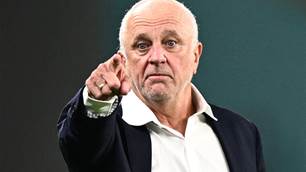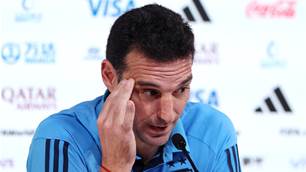ARGENTINA'S exit at the World Cup quarter-final stage to Germany demonstrated that great individuals are no match for a great team unit.
This was a squad arguably more blessed with talent than the 1986 World Cup-winning side inspired by now coach Diego Maradona but they came up short in their first genuine test in the finals in South Africa.
The 4-0 defeat to Germany highlighted problems which had to an extent been foreseen before the tournament began. Lionel Messi, so effective and well serviced at Barcelona by the likes of Xavi and Andres Iniesta, was forced to continually drop deep to receive possession, nullifying his threat further forward.
Argentina were desperately lacking a playmaker, with Juan Roman Riquelme declaring himself unavailable for selection after a difference of opinion with Maradona in the qualifiers. Juan Sebastian Veron, one player capable of linking midfield and attack, featured only against Nigeria and Greece in the group stage.
Inter Milan enforcer Esteban Cambiasso was also a big miss against Germany as Joachim Low's side dominated the midfield battle, with Maradona opting to leave him and experienced clubmate Javier Zanetti at home.
It all started brightly enough, with only the heroics of Nigeria goalkeeper Vincent Enyeama preventing a landslide win for the South Americans in their opening game at Ellis Park.
Messi could have had a hat-trick, but even then the signs of problems to come were there as he regularly had to drop towards the halfway line to get hold of the ball.
Victories over South Korea and Greece allowed Argentina to finish the group phase with a 100% record and a team which had been discounted as favourites because of their uneven qualification record and because of questions over Maradona's abilities as a coach were suddenly being thought of as potential winners.
It was difficult to dispute the bond Maradona had created in the group, and it looked as though that combined with an array of attacking talent led by Messi could steer them to a third world title.
They had some early luck on their side in the last 16 meeting with Mexico, as Carlos Salcido hit the crossbar and then a shot from Andres Guardado whistled past a post before Carlos Tevez gave them the most fortunate of leads when he finished off an attack despite standing in advance of the entire Mexican defence - including goalkeeper Oscar Perez - when the ball was played forward.
An error by Ricardo Osorio allowed Gonzalo Higuain to add a second and then Tevez added a cracking second-half goal to book the team's passage to the last eight, where Germany lay in wait.
The team's weaknesses were brutally exposed within the first three minutes as Bastian Schweinsteiger's free-kick was glanced home by Thomas Muller with the Argentina defence at sixes and sevens. Argentina huffed and puffed to find a way through two hard-working banks of four Germans and were vulnerable to the German counter-attack which had also accounted for England in the previous round.
Maradona's players defended him after the game and urged him to continue, but it seems highly unlikely that he will stay on for long, and almost certainly not for the Copa America next year which is the first post-World Cup test of this side.
On the positive side Messi, Tevez and Higuain are all young enough to be key performers at the 2014 finals in Brazil but the challenge now is to maintain the team spirit fostered by Maradona while finding a tactical approach which gets the best from their brilliant attacking trio.
Defensive organisation is one aspect of that, but what Argentina really need is a creative brain pulling the strings in midfield. With Veron and Riquelme comfortably the wrong side of 30, Argentina have four years to find one.
The 4-0 defeat to Germany highlighted problems which had to an extent been foreseen before the tournament began. Lionel Messi, so effective and well serviced at Barcelona by the likes of Xavi and Andres Iniesta, was forced to continually drop deep to receive possession, nullifying his threat further forward.
Argentina were desperately lacking a playmaker, with Juan Roman Riquelme declaring himself unavailable for selection after a difference of opinion with Maradona in the qualifiers. Juan Sebastian Veron, one player capable of linking midfield and attack, featured only against Nigeria and Greece in the group stage.
Inter Milan enforcer Esteban Cambiasso was also a big miss against Germany as Joachim Low's side dominated the midfield battle, with Maradona opting to leave him and experienced clubmate Javier Zanetti at home.
It all started brightly enough, with only the heroics of Nigeria goalkeeper Vincent Enyeama preventing a landslide win for the South Americans in their opening game at Ellis Park.
Messi could have had a hat-trick, but even then the signs of problems to come were there as he regularly had to drop towards the halfway line to get hold of the ball.
Victories over South Korea and Greece allowed Argentina to finish the group phase with a 100% record and a team which had been discounted as favourites because of their uneven qualification record and because of questions over Maradona's abilities as a coach were suddenly being thought of as potential winners.
It was difficult to dispute the bond Maradona had created in the group, and it looked as though that combined with an array of attacking talent led by Messi could steer them to a third world title.
They had some early luck on their side in the last 16 meeting with Mexico, as Carlos Salcido hit the crossbar and then a shot from Andres Guardado whistled past a post before Carlos Tevez gave them the most fortunate of leads when he finished off an attack despite standing in advance of the entire Mexican defence - including goalkeeper Oscar Perez - when the ball was played forward.
An error by Ricardo Osorio allowed Gonzalo Higuain to add a second and then Tevez added a cracking second-half goal to book the team's passage to the last eight, where Germany lay in wait.
The team's weaknesses were brutally exposed within the first three minutes as Bastian Schweinsteiger's free-kick was glanced home by Thomas Muller with the Argentina defence at sixes and sevens. Argentina huffed and puffed to find a way through two hard-working banks of four Germans and were vulnerable to the German counter-attack which had also accounted for England in the previous round.
Maradona's players defended him after the game and urged him to continue, but it seems highly unlikely that he will stay on for long, and almost certainly not for the Copa America next year which is the first post-World Cup test of this side.
On the positive side Messi, Tevez and Higuain are all young enough to be key performers at the 2014 finals in Brazil but the challenge now is to maintain the team spirit fostered by Maradona while finding a tactical approach which gets the best from their brilliant attacking trio.
Defensive organisation is one aspect of that, but what Argentina really need is a creative brain pulling the strings in midfield. With Veron and Riquelme comfortably the wrong side of 30, Argentina have four years to find one.
Copyright (c) Press Association
Related Articles

Socceroos coach says Argentina can only 'play two ways'

Argentina coach on 'inferior' Socceroos: 'I don't fully agree'













